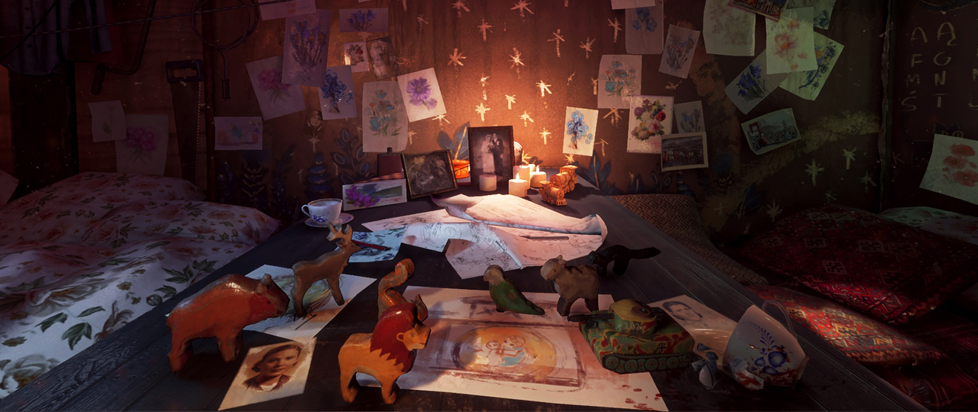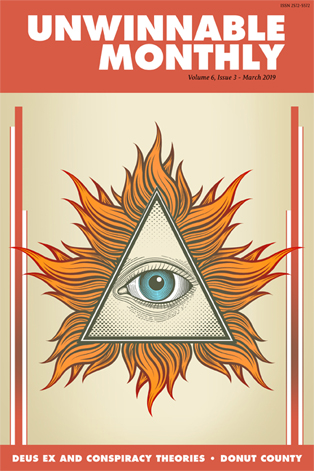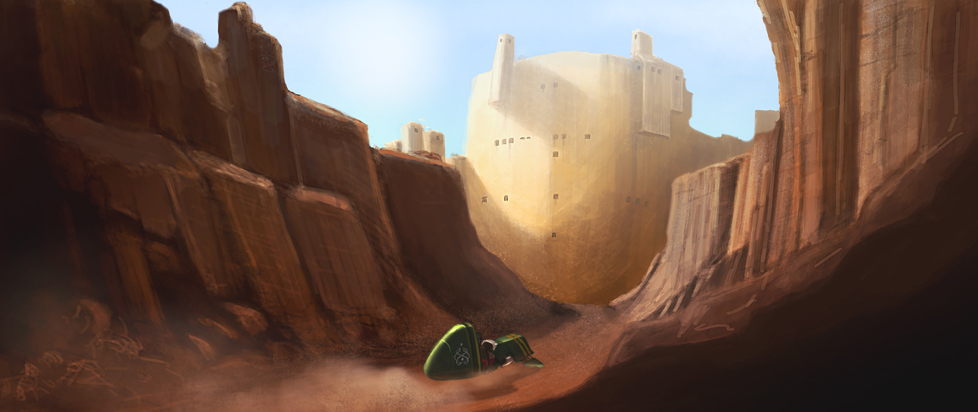
Paradise Lost
 This column is a reprint from Unwinnable Monthly #113. If you like what you see, grab the magazine for less than ten dollars, or subscribe and get all future magazines for half price.
This column is a reprint from Unwinnable Monthly #113. If you like what you see, grab the magazine for less than ten dollars, or subscribe and get all future magazines for half price.
———
This series of articles is made possible through the generous sponsorship of Epic’s Unreal Engine. While Epic puts us in touch with our subjects, they have no input or approval in the final story.
———
In most post-apocalyptic stories, be it zombies or plague or nukes, the apocalypse is a moment of calamitous change that sweeps the world, clearly and irrevocably dividing history into before and after. But what of an apocalypse of degrees, of slowly building self-destructive tendencies? What if the point of no return is already in the rear view mirror? What if, a decade from now, you can look back and clearly see that moment, and all the things that contributed to it, and all the ways it could have been stopped or moderated, if only you had been paying attention?
These are just some of the questions that Paradise Lost, from PolyAmorous Games, seeks to answer. In a world where World War II never ended, where a different sort of cold war sprung up, Paradise Lost confronts grief and acceptance across two timelines while trying to learn if love and beauty will take new forms after the end of the world.
Developed by a team of veterans and novices alike and based in Poland, the hope is to build a framework for a new game genre that sits somewhere between traditional adventure games and the more personal journeys found in walking simulators.
PolyAmorous took time out of a very busy schedule to chat about their game, the power of kinesthesia, the cycle of grief and more.

I think the first thing that grabbed my attention about Paradise Lost is your use of the five stages of grief as a framework for the game. How are you approaching this? Have other games used similar framing in a way that has given you some guidance?
We’ve all been through some traumatic experiences in our lives. Some of them still resonate in our heads, some have been dealt with. Since loss is the main theme of the game, we placed the events and the levels on a path to acceptance. Kübler-Ross model has been popularized over past decades, so we were familiar with it. Naturally, we’re aware it’s no longer valued in contemporary psychology – we’ve asked our therapists.
We simply built the story hooks, the environment and its colors, the speed and type of interactions, etc., around a general emotional mood map for our game.
The site talks a lot about kinesthetic interactions. Can you break down what those are and how they work within the context of the game?
You are for sure familiar with Quantic Dream games, be it Fahrenheit, Heavy Rain or lately Detroit: Become Human. In all of David Cage’s games there is this strong feeling of kinesthesia when interacting with the world – if you swipe a broom across the floor you move your mouse or analog stick in the same way that your character is moving his hands. This creates more immersion and the feeling of actually being the one exploring the world and trying hard to solve its puzzles – and so we’re aiming to reach the same feeling in Paradise Lost. Combined with first person perspective, the act of actually physically moving your hand and seeing your character move their hand as well is gripping and helps to convey the feelings properly.

Along these lines, the lack of fail states make for an accessible game, but I imagine there are design challenges that come with that. Can you talk about your ideas regarding this? Does a lack of fail states make for a less game-y game?
It actually does not. It just means that during a single playthrough you won’t ever be forced to, nor feel the need to, reload the game. We do not have fail states that will bar you from finishing the game; there are still some moments where you can fail, and that’s just okay. Your failure will move the story onto a different path.
There is a political current in the game – the Nazi ruins, the Slavic pagan idol, even Milton’s poem all have political connotations of varying degrees. Can you talk about Paradise Lost’s political context? Is there a connection between the game’s story and Poland, both post-WWII and today?
The connection runs deep and strong. We actually wanted to stay away from politics and focus more on the effects of a conflict, its different POV’s and heavy relativism. One could draw a lot of similarities between politics of post-WWII and today’s Poland but I don’t think this is the place or time to delve into them, though. We aim to create a story that will allow you to feel the danger connected to closing yourself in an information bubble and mindlessly following the leader who seems fit for your narrative. Players may find a lot of parallels to current right wing/left wing discussions, see the effect of dividing people through propaganda and selling lies as truth. Players will be put in a position where they have to choose between suffering the consequences of harsh truth or keeping the status quo with what they might deem as white lies.

There are two timelines in the game’s narrative. Can you talk a bit about each of them, and how they intertwine?
First of all, there’s a story of a young kid losing his mum and through her death, his safe haven. He traverses the deadly, wintery, irradiated outside world to fulfill mum’s dying wish – to reach her old home, a marvelous underground bunker. The place is almost totally empty, though, and the machinery that once helped inhabitants to survive inside is mostly dead – so he needs to find out how to either escape it, or bring it back to its old glory. There’s but one person to help him out – a woman’s voice guiding him from the speakers, identifying herself as Eve.
The second timeline is the history of the bunker. The kid has opportunity to learn about it through specific terminals – allowing the Player to not only witness, but also alter the events of its inhabitants. Through series of memoirs of long forgotten days we learn and change what happened to people who used to live here, and why the place is now empty.
Both retrofuturism and the post-apocalypse are often used ideas that have managed to hold on to their versatility, allowing creators to interpret both in vastly different ways. How is your retrofuturistic post-apocalypse unique?
It’s a world where World War 2 never ended; in turn, it changed into a cold-war-like scenario, where every major empire was still trying to hold onto its position. The addition of Slavic elements and hints of magic are setting us apart as well. And there’s way more to come, so we don’t want to spoil everything!

What do you hope players take away from Paradise Lost?
We hope to help those that are troubled with grief from heavy loss; it is, after all, a journey to acceptance, at its core. We’d also like to inspire everyone to seek answer to an age old question – what does it means to be human? And how they we better ourselves as humans? But those lofty ideas aside, we’d love the players to remember the unique world, setting and lore of our game, the focus on Slavic myths, the gorgeous AAA-level graphics and beautiful, haunting music.
Why did you choose Unreal Engine 4? Are there any unexpected benefits or challenges to it?
To cut the long story short, it’s the best engine out there. We absolutely love working with it, the process is swift, we feel very much supported by the Epic team (with special thanks to Sjoerd, Roman and Alex – we love you, guys!). Even something that we thought is gonna be very complicated or even impossible to be done, we’ve managed to implement, with a little bit of outside help . . . But more on that when the game is out!
Has the Dev Grant allowed you to do anything you otherwise would not have been able to?
It certainly put us back on the stage again. We don’t share a lot of the work that’s being done during production and, from outside, it may seem that not a lot has happened. Landing on that Epic Games list was not only as rewarding as being on the XXL Freshmen year – it made some cool people approach us, bringing new opportunities. But I think the best part was the knowing that the crazy hard work our wonderful team has put into this project was starting to pay off.
* * *
Paradise Lost is aiming for first quarter release in 2020. If you are at GDC 2019, PolyAmorous will be part of the European Game Showcase. You can check also out check out their website or follow them on Twitter to learn more. They’ll have something cool to show off in early August.




